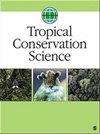Interactions Between People and Nigeria-Cameroon Chimpanzee (Pan troglodytes ellioti) Around Mbam-Djerem National Park, Central Cameroon
IF 1.6
4区 环境科学与生态学
Q2 BIODIVERSITY CONSERVATION
引用次数: 1
Abstract
Understanding the interactions between local people and chimpanzees is crucial to develop sustainable wildlife conservation strategies and management policy in the Mbam-Djerem National Park (MDNP). The MDNP covers about 416,512 ha and shelters the Nigeria-Cameroon chimpanzee (Pan troglodytes ellioti) being the most endangered of all currently recognized chimpanzee subspecies. Close to 30,000 people live in the periphery of the MDNP and depend on the park’s resources for subsistence. We investigated the extent of, and factors leading to, the interactions between people and chimpanzees through a socio-economic survey focusing on households (124) and individual interviews (38) in 30% of villages around MDNP. About 95% of the respondents stated that human–wildlife conflict is an issue around MDNP. Access to resources (78.9%), crop damage (84%), and animal attack (11.3%) were the main sources of conflicts. The ground squirrel Xerus erythropus (59.7%), the green monkey Chlorocebus aethiops (20.2%), chimpanzees (7.3%) and baboons Papio anubis (5.6%) were identified as the main conflict animals and the destroyed crops included peanuts (70.2%), maize (15%) and cassava (5%). The population perceptions differed between the park’s four sectors and were significantly influenced by education and the main livelihood activity. The study also provided quantitative evidence on the role of personal and religious beliefs on the behavior towards chimpanzees. Our findings suggest that the improvement of income-generating activities and education will contribute to strengthening the conservation of chimpanzees.喀麦隆中部姆巴姆杰雷姆国家公园周围的人与尼日利亚喀麦隆黑猩猩的互动
了解当地人与黑猩猩之间的相互作用对于制定可持续的野生动物保护战略和管理政策至关重要。MDNP占地约416,512公顷,是目前已知的所有黑猩猩亚种中最濒危的尼日利亚-喀麦隆黑猩猩(Pan troglodytes ellioti)的避难所。近3万人生活在MDNP的周边地区,依靠公园的资源维持生计。我们通过对MDNP周围30%村庄的家庭(124个)和个人访谈(38个)进行社会经济调查,调查了人与黑猩猩之间互动的程度和导致因素。大约95%的受访者表示,人类与野生动物的冲突是MDNP的一个问题。获取资源(78.9%)、作物损害(84%)和动物袭击(11.3%)是冲突的主要根源。主要冲突动物为地松鼠Xerus erythropus(59.7%)、绿猴Chlorocebus aethiops(20.2%)、黑猩猩(7.3%)和狒狒Papio anubis(5.6%),被破坏的作物包括花生(70.2%)、玉米(15%)和木薯(5%)。人口的看法在公园的四个部门之间存在差异,并受到教育和主要生计活动的显著影响。该研究还为个人信仰和宗教信仰对黑猩猩行为的影响提供了定量证据。我们的研究结果表明,改善创收活动和教育将有助于加强黑猩猩的保护。
本文章由计算机程序翻译,如有差异,请以英文原文为准。
求助全文
约1分钟内获得全文
求助全文
来源期刊

Tropical Conservation Science
BIODIVERSITY CONSERVATION-
CiteScore
3.60
自引率
5.90%
发文量
16
审稿时长
>12 weeks
期刊介绍:
Tropical Conservation Science is a peer-reviewed, open access journal that publishes original research papers and state-of-the-art reviews of broad interest to the field of conservation of tropical forests and of other tropical ecosystems.
 求助内容:
求助内容: 应助结果提醒方式:
应助结果提醒方式:


